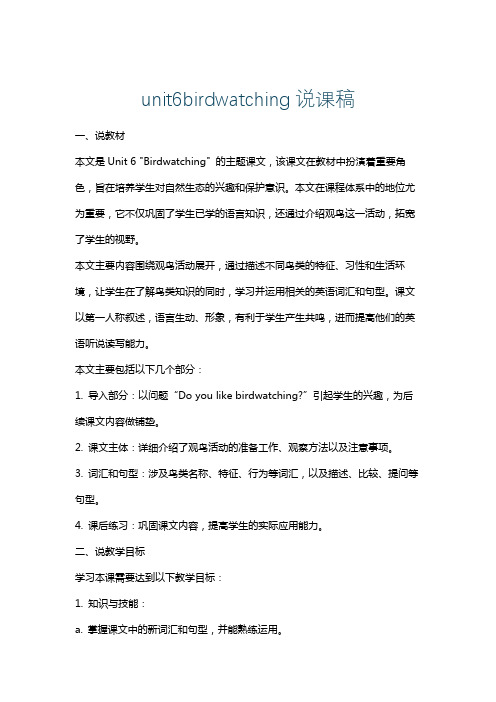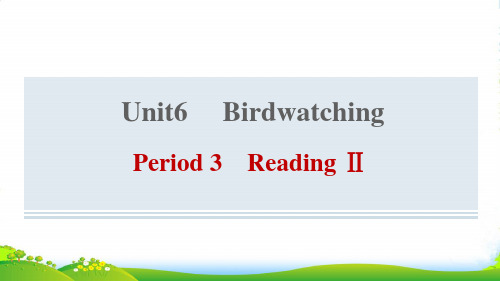八年级英语上册 Unit 6 Birdwatching Period 3 Grammar练习 (新版)牛津版
unit6birdwatching说课稿

unit6birdwatching说课稿一、说教材本文是Unit 6 "Birdwatching" 的主题课文,该课文在教材中扮演着重要角色,旨在培养学生对自然生态的兴趣和保护意识。
本文在课程体系中的地位尤为重要,它不仅巩固了学生已学的语言知识,还通过介绍观鸟这一活动,拓宽了学生的视野。
本文主要内容围绕观鸟活动展开,通过描述不同鸟类的特征、习性和生活环境,让学生在了解鸟类知识的同时,学习并运用相关的英语词汇和句型。
课文以第一人称叙述,语言生动、形象,有利于学生产生共鸣,进而提高他们的英语听说读写能力。
本文主要包括以下几个部分:1. 导入部分:以问题“Do you like birdwatching?”引起学生的兴趣,为后续课文内容做铺垫。
2. 课文主体:详细介绍了观鸟活动的准备工作、观察方法以及注意事项。
3. 词汇和句型:涉及鸟类名称、特征、行为等词汇,以及描述、比较、提问等句型。
4. 课后练习:巩固课文内容,提高学生的实际应用能力。
二、说教学目标学习本课需要达到以下教学目标:1. 知识与技能:a. 掌握课文中的新词汇和句型,并能熟练运用。
b. 能够用英语描述鸟类特征和习性。
c. 了解观鸟活动的准备工作、观察方法及注意事项。
2. 过程与方法:a. 通过小组合作,培养学生观察、描述、讨论和解决问题的能力。
b. 借助图片、视频等教学资源,提高学生的听说读写技能。
3. 情感态度与价值观:a. 培养学生对自然生态的兴趣,增强环保意识。
b. 培养学生热爱生活、热爱大自然的高尚情操。
三、说教学重难点本文教学重难点如下:1. 词汇和句型的掌握:要求学生熟练掌握课文中的新词汇和句型,并能灵活运用。
2. 观鸟知识的理解:要求学生了解鸟类特征、习性和生活环境,提高观察、描述和讨论的能力。
3. 情感态度的培养:引导学生关注自然生态,培养环保意识。
在教学过程中,应注重对重难点的讲解和练习,确保学生能够熟练掌握。
Unit6Birdwatching辅导讲义(学生版)牛津译林版英语八年级上册

The two twins don’t seem to get used to the l 3 now. They are experiencing some culture shock in their new h 4 .The transition (过渡期) is d 5 for the pandas. They don't seem to carefor new food and don't understand our l 6 .Luo Yunhong, a keeper at the panda research center, told the People's Dailythat the twins — like American biscuits s___7_ much that they have to put someAmerican biscuits in the food they eat. They think it is a long time to help thembreak their e 8 habit.The People's Daily also r 9 that Meilun and Meihuan can’tunderstand Sichuan dialect, b 10 they can understand some simple English phrases such as “e here.”【课后巩固训练】一、单项选择()1.Today is awful day because I catch bad cold and cough a lot.A. a; anB. an; aC. a; /D. an; /()2.Do you write a report ______ an animal _______ danger for the club?A. about; onB. on; inC. to; fromD. in; with()3. He found ________ to sleep.A. difficult to getB. it difficult gettingC. it difficult to getD. that difficult to get()4. Many birds die ______ they are ______ their homes.A. because of; lostB.because of; losingC. because; losingD.because; lost()5. — Look, there is a lot of rubbish in the river.—Yes, people say that 80 per cent of fish in this river ______ live long.A. isn’tB. aren’tC. doesn’tD. don’t()6. I think cycling isn’t as exciting as climbing.That’s because you can’t ride well. _______, both of th em are interesting.A. In the beginningB. In factC. As a resultD. At last()7. —Don't be angry with your kid when he makes a mistake again, will you?—No, I won't. I know that of us are perfect after all.A. allB. nobodyC. eachD. none()8. — Who is the man over there? Is it Mr. Wu?— It ________ him, but I am not quite sure.A. may beB. maybeC. must beD. is()9. —How hardworking the boy next door is!—Yes. I always hear him ________ every evening.A. plays the violinB. playing violinC. play the violinD. to play the violin()10.The sentence structure of “I found him very interesting”is ______.A. S+V+PB. S+V+OC. S+V+DO+OCD. S+V+IO+DO()11.The number of the giant pandas in China is getting___________ but there are_____________ redcrowned cranes.A. larger and larger; fewer and fewerB. less and less; smaller and smallerC. more and more; more and moreD. smaller and smaller; fewer and fewer()12.We should advise our students _______hard instead of _______too much time playing games.A. work; spendB. to work; spendC. work; spendingD. to work; spending()13— _____ will the weather______ tomorrow?— I hope it will be _______. There are many wet clothes at home.A. What; be; cloudyB. What; be like; sunnyC. How; be like; fineD. How; be; snowy()14. — ____they are talking to each other!— Yes. They are really ____ to see each other.A. What excited, excitingB. How excited. excitingC. What excitedly, excitedD. How excitedly, excited()15. My mother says that we won’t go on a trip to Malaysia because it is too dangerous.______!You were looking forward to it.A. Never mind.B. Don’t worry about it.C. Enjoy yourselves.D. What a pity.。
八年级英语上册 Unit 6 Birdwatching Period 3 Reading II听读本 (新版)牛津版

Unit 6 Birdwatching
Period 3 Reading Ⅱ
重点句型
1.Many birds live in Zhalong all year round, while some go there only for a short stay.
许多鸟长年生活在扎龙,而有些鸟则去那儿作短暂停留。
2.Some people want to make the wetlands smaller in order to have more space for farms and buildings.
一些人为了开垦农田和建造楼房想把湿地变得更小。
3.Now the Chinese government has made laws to prevent all these things in Zhalong.
现在中国政府已经制定法律来阻止这些事情在扎龙发生。
公交小句
1.My mother is cooking while my father is watching TV.
我妈妈正在做饭,而我爸爸正在看电视。
2.Nothing can prevent him reaching the top of the mountain.
什么也阻止不了他到达山顶。
3.Environment is very important, but some people don't understand the importance of protecting it.
环境非常重要,但是一些人不理解保护它的重要性。
1。
牛津译林版八年级上册Unit 6《Bird watching》(Task and self-asse

牛津译林版八年级上册Unit 6《Bird watching》(Task and self-assessment)教学设计一. 教材分析《Bird watching》是人教版牛津译林八年级上册的一篇文章,主要介绍了鸟类观察这一活动。
文章通过讲述作者和鸟类观察者们一起观察鸟类的过程,使学生了解鸟类观察的方法和技巧,以及观察鸟类给人们带来的乐趣。
本篇文章题材新颖,激发学生对鸟类观察的好奇心,提高学生对英语学习的兴趣。
同时,文章中涉及到的生词和短语也比较丰富,有助于学生扩大词汇量。
二. 学情分析八年级的学生已经具备了一定的英语基础,能够进行简单的听、说、读、写操作。
但是,学生在阅读理解方面还存在一定的困难,特别是对于长篇阅读材料的理解和分析能力。
此外,学生的词汇量有限,对于一些专业术语和生僻词汇可能不太熟悉。
因此,在教学过程中,需要帮助学生理解文章内容,引导学生运用所学知识进行思考和表达。
三. 教学目标1.知识目标:–能够理解文章主要内容,把握文章大意。
–学习并掌握文章中出现的生词和短语。
–了解鸟类观察的方法和技巧。
2.能力目标:–能够运用所学知识进行阅读理解,分析文章结构。
–能够运用所学词汇和句型进行口头表达和写作。
3.情感目标:–培养学生对大自然和生物的热爱,提高学生对英语学习的兴趣。
四. 教学重难点•理解文章主要内容,掌握文章大意。
•学习并掌握文章中出现的生词和短语。
•理解文章中关于鸟类观察的方法和技巧的描述。
•运用所学知识进行阅读理解和口头表达。
五. 教学方法1.任务型教学法:通过完成各种任务,引导学生积极参与课堂活动,提高学生的实践能力。
2.情境教学法:创设真实的情境,使学生在具体的情境中学习英语,提高学生的学习兴趣。
3.合作学习法:鼓励学生之间进行合作,共同完成学习任务,提高学生的团队协作能力。
六. 教学准备1.教师准备:–熟悉教材内容,明确教学目标。
–准备相关教学材料,如PPT、图片、视频等。
2022八年级英语上册Unit6BirdwatchingPeriod3ReadingⅡ习题课件牛津版

3. Today the forests are getting fewer and fewer. We must
____D____ down too many trees.
A. keep people from cutting
B. prevent people from cutting
C. stop people cutting
某事, 其中from可以省去。故选D。
一、用括号内所给单词的适当形式填空 1. David can work out the maths problem __e_a_si_l_y__ (easy) because he is clever. 2. I'm very sorry to keep you _w_a_i_t_in_g__ (wait).
3 cover
8 record; types; changes in their numbers
4 space 5 Society
9 to count; describe 10 understand the importance of
习题链接
题组专训•突破考点
课后巩固•拓展延伸
答案呈现
1B
1 easily
living space for them in the world.
【A点. 拨Mo】remaonrde manodrem; omroe越re 来and越m多or的e , 既可以修饰可数名 词B, 也. M可or以e a修nd饰m不or可e;数les名s a词nd; lleessss and less越来越少, 修饰 不C可. 数Le名ss 词an。d l本ess题; m除o了re 考an查d m名o词re 的可数性外, 还考查了 中文意思, 句意为“越来越多的鸟处于危险中, 因为在世 界D上. ,L它es们s a的nd生le活ss;空le间ss越an来d l越ess少了”。space空间, 通常 为不可数句词。故选B。
牛津译林版八年级英语上册Unit6单元知识复习归纳

牛津译林版八年级英语上册8A Unit 6 Birdwatching单元复习一、重点单词1.birdwatching观鸟2.market市场3.hen母鸡4.sparrow麻雀5.feather羽毛6.swan天鹅7.broad宽的,宽大的8.wing翅膀9.type种类10.rare罕见的,稀有的11.nature大自然,自然界12.wetland(尤指为野生动物保存的)湿地13.provide提供14.cover庇护所15.wildlife野生动物16.perfect极好的,完美的17.round周同,绕一整圈;转过来18.while然而19.stay停留,逗留20.easily容易地,不费力地21.cent分;分币22.space空间23. lead领导,带领24.fisherman(pl. fishermen)渔民,钓鱼的人25. fish捕鱼;钓鱼26.government政府27. prevent防止,预防28. society协会;社会29.record记录30.change变化,改变31.tourist旅行者,观光者32. count计算(或清点)总数;数数33.describe描述34.understand理解,明白35. importance重要性36.south-east东南方37. cover覆盖;包括38.clearly清晰地39. speaker说话人;演讲者40. tour旅行41.form表格42.address地址43.chairperson主席44. introduce介绍45.natural自然的,天然的二、重点短语1.go to the market去市场2.how many types of cranes多少种类的鹤3.in North-east China在中国的东北部4. one of the world's most important wetlands世界上最重要的湿地之一5. provide food and cover for a lot of wildlife给许多野生动物提供食物和庇护所6.a perfect place for some rare birds对一些稀有鸟类来说的完美地方7.all year round -年到头8.for a short stay作短暂停留9. 40 per cent of them它f门中的40%10. make the wetlands smaller使湿地更小11. in order to以便,为的是12. lead to导致13. less and less越来越少14. keep fishing不断捕鱼15. the Chinese government中国政府16. prevent all these things in Zhalong阻止这些事情在扎龙发生17. record their types and changes in their numbers记录下它们的种类和数量上的变化18. understand the importance of the wetlands了解湿地的重要性19. stop something from happening阻止某事发生20. write down写下,记下21. walk a long way走很长的路22. different kinds of不同种类的23. fly to Yancheng飞往盐城24. go birdwatching去观鸟25. take a pair of binoculars带一副望远镜26. get thirsty渴了27. make beautiful sounds发出美妙动听的声音28. bird shows鸟展29. part of our lives我们生命的一部分30. introduce myself自我介绍31. enjoy the natural world享受自然世界32.a member of……的一员33. take part in activities参加活动34. call me on拨……号码给我三、重点句子及点拨1.I often go to the market to watch the birds.我经常去市场看鸟。
人教版初中英语八年级上册Unit 6 Birdwatching 教案2023

人教版初中英语八年级上册Unit 6Birdwatching 教案2023Unit 6 Birdwatching 教案【教学目标】1. 通过本节课的学习,学生能够掌握并运用关于鸟类的词汇和句式;2. 培养学生观察和描述鸟类的能力;3. 通过听、说、读等多种方式培养学生的英语综合运用能力;4. 培养学生对自然环境和生物多样性的关注和保护意识。
【教学重点】1. 学习并掌握关于鸟类的词汇,如鹰、鸽子、鹦鹉等;2. 学习并掌握描述鸟类特征和行为的句式,如"I think the eagle is very beautiful.";3. 培养学生对鸟类的观察和描述能力;4. 引导学生对自然环境和生物多样性的关注。
【教学准备】PPT、小黑板、教材、录音机、图片、实物鸟类模型等。
【教学过程】一、导入(约5分钟)1. 利用图片或实物鸟类模型引入主题,让学生猜测或描述所见鸟类。
二、新课呈现(约15分钟)1. 展示PPT或教材中有关鸟类的图片,启发学生对鸟类外貌和特征的观察。
2. 播放录音,引导学生听听力材料,掌握新课的关键词汇,并进行朗读和模仿。
3. 通过问答的方式帮助学生理解和熟悉鸟类相关的句式,如"Whatdo you think of the parrot?"等。
三、合作交流(约20分钟)1. 分组讨论,每组选择一种鸟类进行介绍,包括鸟类的外貌特征、生活习性等,并准备一个小课件或海报展示。
2. 每组派代表介绍自己所研究的鸟类,其他学生进行提问。
四、巩固练习(约15分钟)1. 听录音,学生根据所听内容判断句子的正误,并进行订正。
2. 配对活动,学生根据图片和描述找出正确的鸟类,并进行口头交流。
五、拓展延伸(约15分钟)1. 展示一些名著中关于鸟类的描写片段,引发学生对文学作品和自然界的关联和思考。
2. 引导学生进行鸟类观察活动,可以在校园或家中观察,学生记录观察到的鸟类外貌特征和行为,并写成观察报告或小作文。
精品学习2018年秋八年级英语上册 Unit 6 Birdwatching Period 3 Gra

Unit 6 BirdwatchingGrammarPeriod 3●1 Take a notebook with you in order to write down what you see.带上笔记本,以便记下你所看到的东西。
[探究] ____________意为“写下,记下”,为“____________”结构,后接________时,________可放在两词之间,也可放在down的后面;后接________时,一定要放在两词中间,且代词要用________形式。
活学活用1. 看黑板上的这个句子。
请把它记下来。
Look at the sentence on the blackboard. Please _________________________________.●2 She saw a baby panda drink her mother's milk.她看见一只小熊猫喝她妈妈的奶。
[探究] see sb do sth意为“________________________”,强调看见动作的________或动作________发生。
I often see the dog cross the busy street alone.我经常看到那条狗独自穿过繁忙的街道。
[拓展] (1)____________________意为“看见某人正在做某事”,强调动作________进行。
I saw him talking with his friends over there.我看到他和他的朋友正在那边谈话。
(2)英语中与see有类似用法的________动词还有hear, watch, feel, notice等。
2.2017·徐州I saw Tom ________ his key in the lock, turn it and open the door.A.put B.puttingC.puts D.to put语法聚焦[动词不定式]1.I often go to the market to watch the birds.2.Now the Chinese government has made laws to prevent all these things.3.Some people want to make the wetlands smaller in order to have more space for farms and buildings.4.Take a notebook with you in order to write down what you see.5.We are now inviting them to help us.6.We need more people to count and describe the birds.●1 不定式作目的状语不定式作状语常用来表示________,可位于句首或句末。
- 1、下载文档前请自行甄别文档内容的完整性,平台不提供额外的编辑、内容补充、找答案等附加服务。
- 2、"仅部分预览"的文档,不可在线预览部分如存在完整性等问题,可反馈申请退款(可完整预览的文档不适用该条件!)。
- 3、如文档侵犯您的权益,请联系客服反馈,我们会尽快为您处理(人工客服工作时间:9:00-18:30)。
Unit 6 Birdwatching Period 3
Grammar
短语互译
1.写下,记下 ____________
2.给鸟拍照 ____________
3.in order to ____________
4.walk a long way ____________
句型在线
1.带上笔记本,以便记下你所看到的东西。
Take a notebook with you ___________________________ what you
see.
2.吴老师同意让我参加他们的学校旅行。
Mr Wu ________________________________________ their school
trip.
3.她看见一只小熊猫喝她妈妈的奶。
She ________ a baby panda ________ her mother's milk.
语法聚焦动词不定式
●1 Take a notebook with you in order to write down what you see.
带上笔记本,以便记下你所看到的东西。
[探究] ____________意为“写下,记下”,为“____________”结构,后接________时,________可放在两词之间,也可放在down的后面;后接________时,一定要放在两词中间,且代词要用________形式。
活学活用
1. 看黑板上的这个句子。
请把它记下来。
Look at the sentence on the blackboard. Please _________________________________.
●2 She saw a baby panda drink her mother's milk.
她看见一只小熊猫喝她妈妈的奶。
[探究] see sb do sth意为“________________________”,强调看见动作的________或动作________发生。
I often see the dog cross the busy street alone.
我经常看到那条狗独自穿过繁忙的街道。
[拓展] (1)____________________意为“看见某人正在做某事”,强调动作________进行。
I saw him talking with his friends over there.
我看到他和他的朋友正在那边谈话。
(2)英语中与see有类似用法的________动词还有hear, watch, feel, notice等。
2.2017·徐州I saw Tom ________ his key in the lock, turn it and open the door.
A.put B.putting
C.puts D.to put
语法聚焦
[动词不定式]
1.I often go to the market to watch the birds.
2.Now the Chinese government has made laws to prevent all these things.
3.Some people want to make the wetlands smaller in order to have more space for farms and buildings.
4.Take a notebook with you in order to write down what you see.
5.We are now inviting them to help us.
6.We need more people to count and describe the birds.
●1 不定式作目的状语
不定式作状语常用来表示________,可位于句首或句末。
They stopped to have a rest. 他们停下来休息了一会儿。
She got up early in order to catch the first bus.
她早起是为了赶第一班公交车。
●2 不定式作宾语补足语
(1)带to的不定式可以跟在某些动词后作________________,如tell, want, ask等动词构成“tell/want/ask sb (not) to do sth”结构,但________后的to可留可省, help sb (to) do sth意为“________________”。
The teacher asked him not to be late next time.
老师要求他下次别迟到。
(2)有些“____________+宾语”之后的不定式符号to通常省略。
________ sb do sth 使某人做某事________ sb do sth 让某人做某事
have sb do sth 让某人做某事
●3 “动词+不定式”与“动词+doing”结构
(1)begin, start, learn, like后接to do 和 doing 时含义________。
(2)stop, remember, forget后接to do 和 doing 时含义________。
stop ________ sth 停下来去做某事
stop ________ sth 停止做(正在做的)某事
remember ________ sth 记得去做某事
remember ________ sth 记得做过某事
forget ________ sth 忘记去做某事
forget ________ sth 忘记做过某事
活学活用
1.2017·郴州—What shall we do this weekend?
—We'll drive to Dongliang Lake ________ boating.
A.to go B.to
C.going D.to going
2.2017·丹东Parents should tell their children ________ unhealthy food. It's bad for their health.
A.not to eat B.not eating
C.to eat D.eating
详解详析
Period 3 Grammar
【课前自主预习】
短语互译
1.write down 2.take photos of the birds
3.为了 4.走很长一段路
句型在线
1.in order to write down
2.agreed to let me join
3.saw; drink
【课堂互动探究】
句型透视
●1 write down; 动词+副词;名词;名词;代词;宾格
write it down
●2 看见某人做某事;全过程;经常; see sb doing sth; 正在;感官
A 考查非谓语动词。
根据句意“我看见汤姆把钥匙插进锁里,转动钥匙并打开了门”可知此题考查动词短语see sb do sth,意为“看到某人做某事(强调做某事的过程)”。
故选A。
语法聚焦
●1 目的
●2 宾语补足语; help; 帮助某人做某事;使役动词; make; let
●3 相近;不同; to do; doing; to do; doing; to do; doing
1.A
2.A 考查非谓语动词。
根据句意“父母应该告诉他们的孩子们不要吃不健康的食物,
不健康的食物对他们的健康有害”可知此题考查动词短语tell sb not to do sth,意为“告诉某人不要做某事”。
故选A。
DCC。
